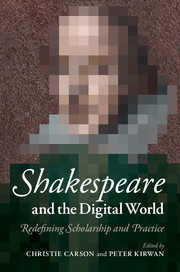Book contents
- Frontmatter
- Contents
- Notes on contributors
- Acknowledgements
- Shakespeare and the digital world
- Part I Defining current digital scholarship and practice
- Part II Defining current digital scholarship and practice
- Half-time: A pause for reflection
- Part III Redefining the boundaries and practices of Shakespeare studies online
- Part IV Redefining the boundaries and practices of Shakespeare studies online
- 14 Changing a culture with the Shakespeare Birthplace Trust
- 15 Developing a digital strategy
- 16 The impact of new forms of public performance
- 17 Creating a critical model for the twenty-first century
- Conclusion
- Index
- References
15 - Developing a digital strategy
Engaging audiences at Shakespeare’s Globe
Published online by Cambridge University Press: 05 July 2014
- Frontmatter
- Contents
- Notes on contributors
- Acknowledgements
- Shakespeare and the digital world
- Part I Defining current digital scholarship and practice
- Part II Defining current digital scholarship and practice
- Half-time: A pause for reflection
- Part III Redefining the boundaries and practices of Shakespeare studies online
- Part IV Redefining the boundaries and practices of Shakespeare studies online
- 14 Changing a culture with the Shakespeare Birthplace Trust
- 15 Developing a digital strategy
- 16 The impact of new forms of public performance
- 17 Creating a critical model for the twenty-first century
- Conclusion
- Index
- References
Summary
Digital culture is changing at a rapid rate, impacting on how we work, communicate and socialise, ushering in an age where audiences are constantly connected to the web wherever they are. The social web has given every member of the audience the chance to author, publish, edit, distribute, comment on and share content. For arts institutions, this proliferation of digital technologies and platforms has made participation in the life of a cultural organisation possible from anywhere in the world at any time: attendance is no longer a prerequisite for experience. But in this connected world, where an organisation’s online presence may not just be an audience’s first port of call, but their only point of contact, the very concept of the theatre audience needs to be re-imagined. This chapter addresses the ways in which a theatre company can make itself relevant to new generations of young people and tourists through an effective digital strategy, thereby creating new Shakespeare audiences.
If engagement and active participation are the watchwords of cultural mission, then digital platforms offer unique opportunities and advantages for audience interaction. At the same time, they also pose new challenges in terms of quality and assumptions about authority. If content is no longer king, and Web 2.0 is all about community, then what role does an arts organisation have in encouraging debate at the same time as retaining a role as an authoritative creator of cultural meaning? Navigating these waters was a central component of my former work at Shakespeare’s Globe in online education and digital communications, first as Online Content Editor for the Globe Education department and then as Digital Manager for the whole organisation. In this chapter, I look at the ways in which Shakespeare’s Globe has sought to engage audiences of all ages and understandings in its work from its early digital endeavours, particularly in education, before looking at the vision and objectives of its current digital strategy. In doing so, I hope to explore some of the discoveries this work has uncovered, as well as discussing how digital platforms have changed the dynamic between the theatre and its audiences.
- Type
- Chapter
- Information
- Shakespeare and the Digital WorldRedefining Scholarship and Practice, pp. 202 - 211Publisher: Cambridge University PressPrint publication year: 2014
References
- 2
- Cited by



